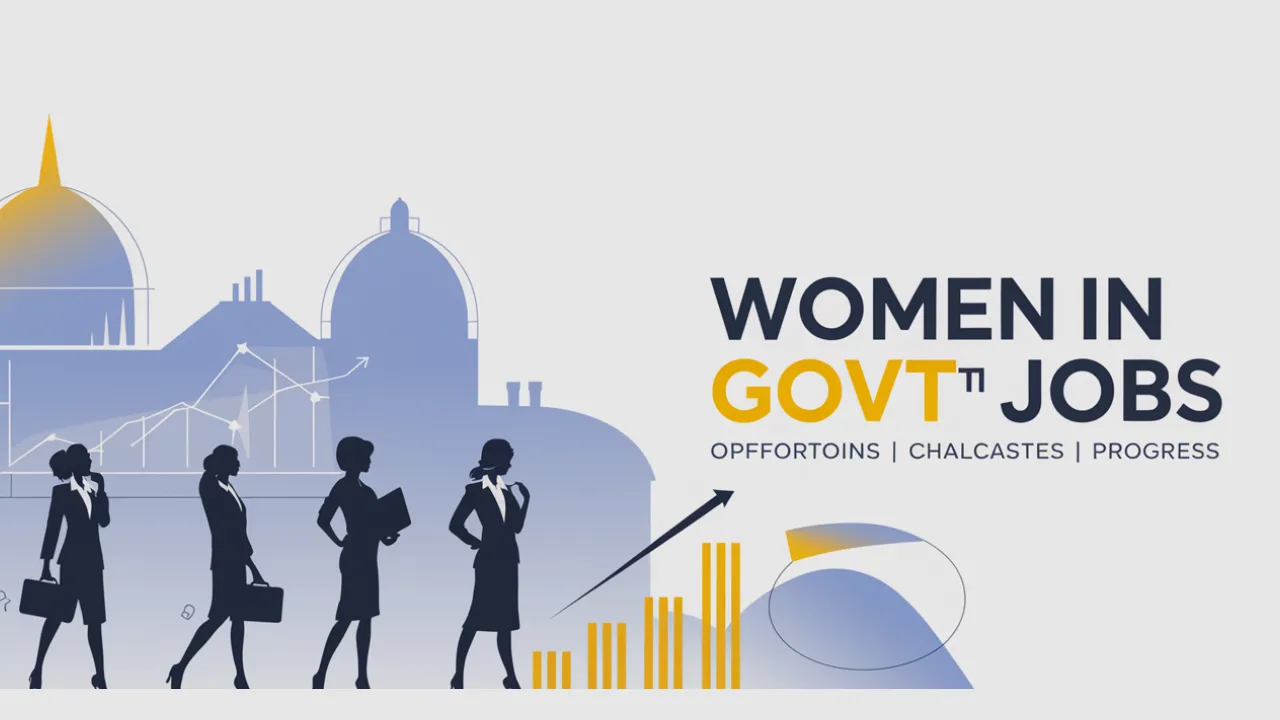Growing Role of Women in Government Jobs: The increasing presence of women in government jobs marks a significant shift in India’s employment landscape. As more women enter public service roles, it reflects society’s progress towards gender equality and inclusivity in workplaces. These positions not only offer stability but also provide avenues for women to influence public policy, contribute to governance, and participate in nation-building efforts.
This article highlights how the participation of women in government jobs has expanded, discusses the diverse opportunities available, examines the challenges women still face, and showcases success stories. It also outlines strategies for women to thrive in public sector careers and the initiatives aimed at supporting their growth.
Overview Table
| Aspect | Details |
| Key Opportunities | Civil services, defence, STEM fields, diplomacy, administrative services |
| Advantages | Equal pay, job security, leadership roles, career progression |
| Challenges | Work-life balance issues, gender bias, workplace discrimination |
| Success Stories | Women in leadership, impactful contributions in governance and public welfare |
| Support Strategies | Mentorship, networking, education, training opportunities |
| Government Initiatives | Gender equality policies, workplace safety measures, flexible work arrangements |
Women in Government Jobs
The role of women in government jobs has evolved considerably, breaking traditional gender norms and opening new doors for professional growth. Public sector employment provides a platform for women to engage in administrative services, defence, policymaking, and technical roles, ensuring they have a voice in shaping national and community-level decisions.
The appeal of government employment is not limited to stability and benefits; it extends to meaningful participation in leadership, governance, and public service. With structured career paths and equal pay policies, more women are gravitating toward these roles, finding opportunities to grow professionally and make lasting contributions to society.
Opportunities for Women in Government
Diverse Roles
Today, government roles span across multiple sectors, giving women a wide range of career options. Whether it is the civil services, administrative posts, defence forces, or scientific research in technical fields, women have the opportunity to work in areas that were previously male-dominated. Positions in diplomacy, national security, education, healthcare, and policy-making are now more accessible, reflecting a conscious move towards inclusivity.
Equal Pay and Job Security
One of the strongest attractions of government jobs is the assurance of equal pay. Unlike some private sectors where gender pay gaps persist, government employment guarantees equal remuneration for equal work. This commitment to fairness, along with job security, structured promotions, and long-term benefits, makes the public sector a desirable option for women seeking both professional and financial stability.
Challenges Faced by Women
Work-Life Balance
Balancing professional duties with personal responsibilities continues to be a challenge for many women in government jobs. While some departments offer flexible work schedules and family-friendly policies, the nature of public sector roles often requires strict adherence to deadlines, transfers, and extended working hours, making it difficult for women to manage family and career effectively.
Gender Bias and Discrimination
Despite considerable progress, gender biases still exist within government structures. These biases may manifest in subtle forms, such as fewer opportunities for leadership roles, unequal task assignments, or exclusion from key decision-making processes. While formal policies promote equality, deep-rooted societal attitudes and workplace cultures sometimes hinder the full integration of women into leadership positions.
Success Stories of Women in Government
Leadership Positions
Many women have risen to top positions within government departments, setting examples of perseverance and dedication. These leaders are not only breaking the glass ceiling but are also shaping the future of governance. Their stories serve as inspiration for young women aspiring to enter public service and demonstrate how talent and hard work can overcome gender barriers.
Impactful Contributions
Women in government roles have led numerous successful initiatives in healthcare, education, social justice, and policy reform. Their contributions often lead to significant societal changes, highlighting the critical role they play in governance. Whether it’s managing public welfare programs, leading disaster relief efforts, or participating in diplomatic missions, their impact is evident at all levels of administration.
Strategies for Success
Mentorship and Networking
Building strong professional relationships is crucial for career growth in the government sector. Mentorship programs provide guidance, encouragement, and valuable insights that help women navigate workplace challenges. Networking with peers and senior professionals also opens doors to new opportunities and creates support systems within departments.
Continued Education and Training
The public sector frequently offers access to advanced training programs, leadership courses, and workshops aimed at skill development. Women can leverage these resources to enhance their qualifications, stay updated with industry developments, and prepare for higher responsibilities. Continued education is essential for staying competitive and achieving long-term success in government careers.
Policy Initiatives to Support Women
Gender Equality Policies
Recognizing the importance of inclusivity, many government departments have introduced robust gender equality policies. These include transparent recruitment processes, equal promotion opportunities, maternity leave benefits, and special leadership development programs for women. Such measures aim to eliminate gender-based disparities and encourage more women to take up key roles.
Workplace Safety Measures
Ensuring a safe and respectful working environment is essential for supporting women’s participation in government jobs. Strict anti-harassment policies, grievance redressal mechanisms, and safety guidelines help create a work culture based on respect and dignity. These measures foster a sense of security, allowing women to focus on their professional growth without fear of discrimination or harassment.
Conclusion
The growing participation of women in government jobs is a positive sign of societal progress. While opportunities have expanded and policies have evolved to support gender equality, challenges such as balancing personal and professional lives, gender biases, and cultural hurdles still exist. Addressing these issues requires a continued commitment from policymakers, employers, and society at large.
By encouraging mentorship, promoting continuous learning, and ensuring safe workplaces, the public sector can further empower women to thrive. As more women take on leadership roles and contribute meaningfully to governance and policy-making, they not only inspire future generations but also strengthen the overall effectiveness of government institutions.
FAQs
What are the main benefits of government jobs for women?
Government jobs offer equal pay, job security, structured career growth, leadership opportunities, and long-term financial benefits.
Which fields in government jobs are popular among women?
Women are increasingly taking up roles in civil services, defence, STEM fields, diplomacy, and administrative services.
What challenges do women face in government employment?
Common challenges include managing work-life balance, dealing with gender bias, and facing obstacles in promotions or leadership opportunities.
Are there policies to support women in government roles?
Yes, policies promoting gender equality, maternity benefits, workplace safety, and leadership development have been introduced to support women.
How can women advance their careers in government jobs?
Women can focus on networking, mentorship, continued education, skill development, and actively participating in leadership and training programs.
















